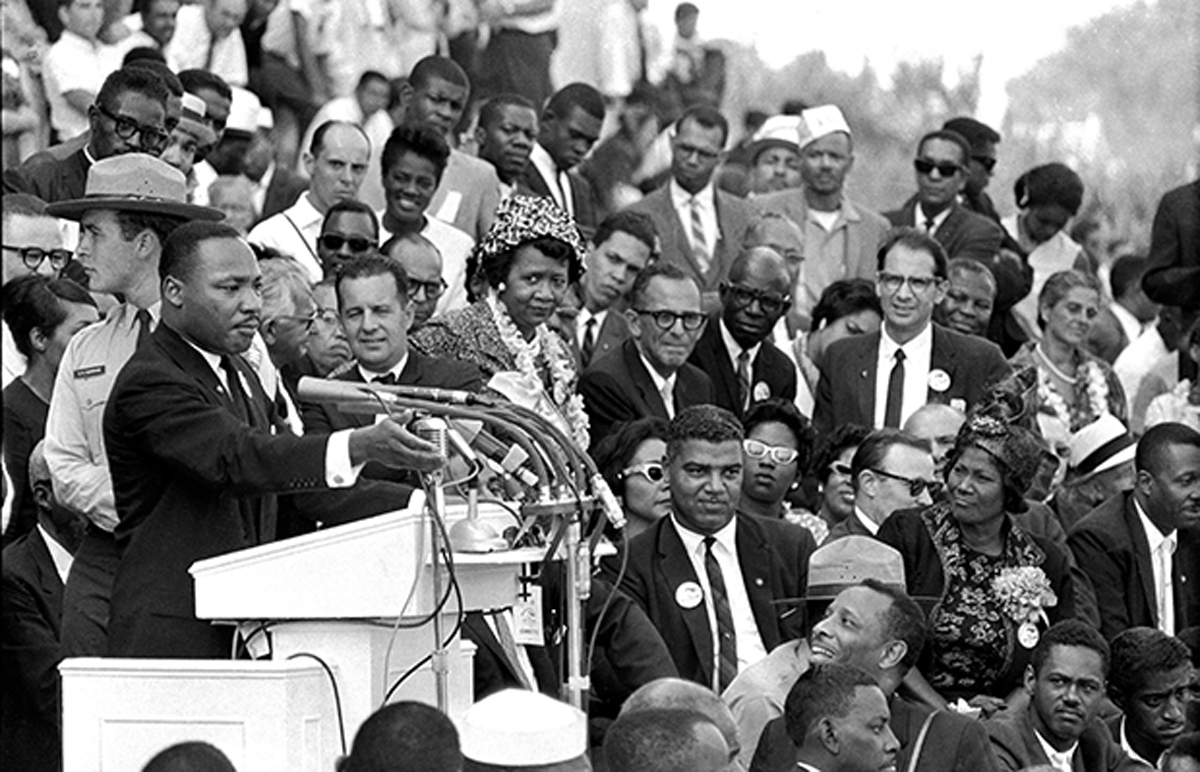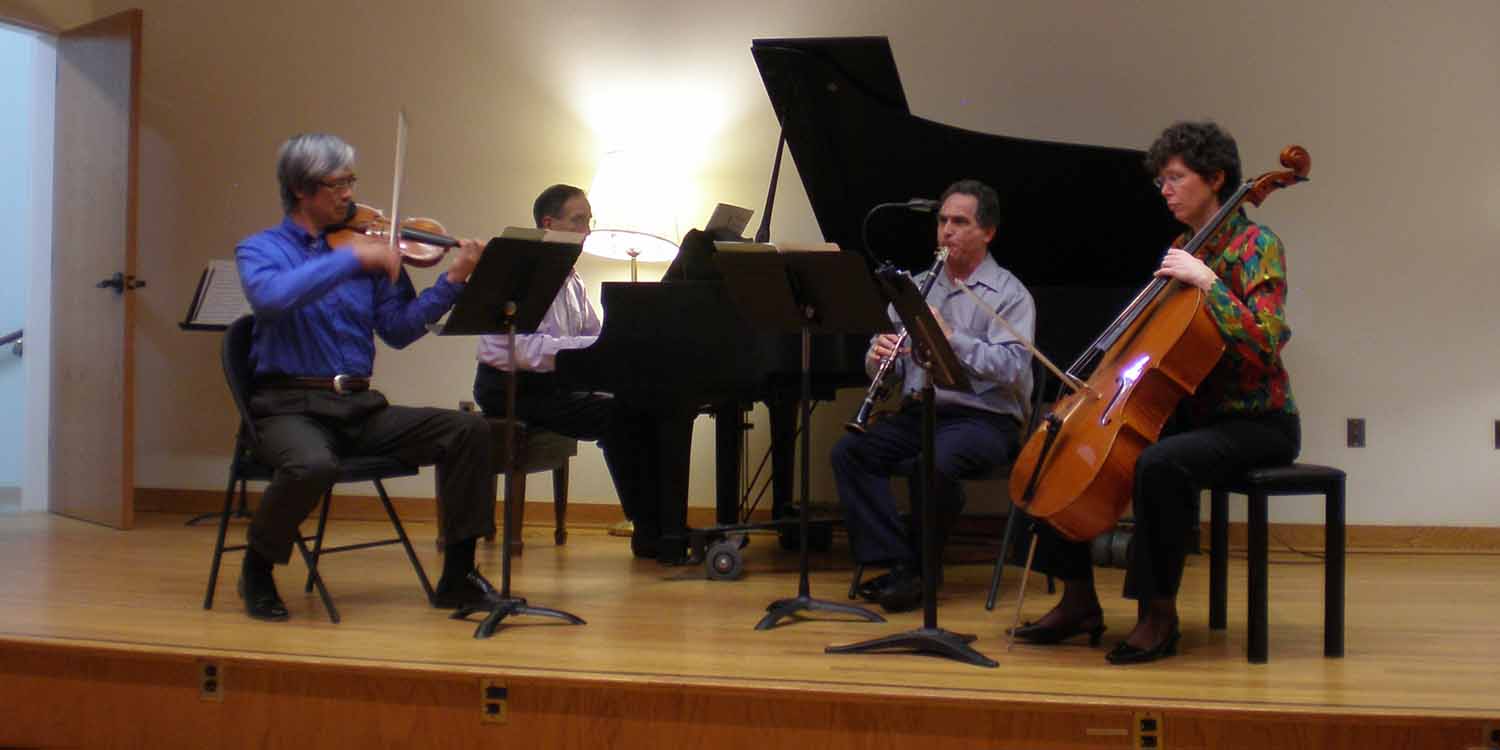








Birthday Quartet
Recording from Feb. 18, 2014 concert
with Xi Yang, violin; Fred Jacobowitz, clarinet; Bonnie
Thron, cello; and Thomas Warburton, piano.
This performance was of all four movements, but I have discarded the
last movement and replaced it in October 2015; so this video is of the
first three movements only.

video
(YouTube)
Clarinet Quartet
Score, legal size Cover
Clarinet Quartet Score, letter size Cover Clarinet Quartet Parts
Piano Quartet Score, legal size Cover
Piano Quartet Score, letter size Cover Piano Quartet Parts
I. How Long? Not Long
And they're off [8:32] MP3 recording
II. Gate gate paragate parasamgate
bodhi swaha
Adagio
mahayana [7:58] MP3 recording
III. Mine Eyes Have Seen the Glory
of the Coming
of
the Lord
Picco di
montagna
[7:51] MP3 recording
In early 2010, I had a peculiar dream of
a respectful conversation with Elvis Presley. He said I should write a symphony
based on speeches by Martin Luther King Jr. Well—who can refuse the King of
Rock and/or Roll? Especially since I share my birthday, January 15, with MLK,
and classical radio stations frequently play a composer's music on his
birthday.
The
speeches of Martin Luther King are
copyrighted, and the MLK Center is notoriously litigious. Thus this
cannot be a
choral work, nor can it have direct references to texts in the score.
Instead I
use the rhythms and inflections from speeches that are incorporated in
themes.
The first movement uses a few phrases from the “How long? Not long”
speech of
March 25, 1965 at the Alabama State Capitol. The second movement is
based on
the Buddhist mantra “Gate gate, paragate, parasamgate, bhodi swaha”;
this can
be roughly translated (as by Ram Dass) as “Beyond, beyond the beyond,
beyond
the beyond the beyond, hail the goer.” The third movement returns to
MLK and
uses bits of the “I’ve Been to the Mountaintop” speech given on April
3, 1968
in Memphis Tennessee. The first version of the fourth movement (started
writing
it Aug. 28, 2013) used the final section of the Dream Speech given at
the March
on Washington on August 28, 1968, with narrator. After hearing
the chamber version, I thought this first version of the fourth
movement was not suitable, and I withdrew it.
On August 29, 2015, I started writing a second version of the last movement. The beginning uses the rhythm of the words “And so even though we face the difficulties of today and tomorrow, I still have a dream. It is a dream deeply rooted in the American dream. I have a dream that one day this nation will rise up and live out the true meaning of its creed: ‘We hold these truths to be self-evident, that all men are created equal.’ I have a dream that one day on the red hills of Georgia, the sons of former slaves and the sons of former slave owners will be able to sit down together at the table of brotherhood.” The music then departs from the text, with the motives from “table of brotherhood” and “I have a dream” used repeatedly. Next comes “Let freedom ring” along with other phrases from the speech. The movement closes with “Free at last, free at last (repeated), thank God almighty we are free at last!”
After
writing the two chamber versions, I orchestrated the score as Birthday
Symphony, which was performed by the Raleigh Symphony Orchestra in
2016; the last movement was performed by the Durham Symphony. However,
I was displeased with my orchestration, and in 2023 I withdrew the
symphonic version.
Xi Yang began his distinguished music career when he
was a student at the Conservatory of Music in Beijing, China
where he studied both violin and viola Performance. He had his
first solo debut when he was 9 years old. By the age of 12 he
made an average of 200 solo appearances a year in China. He won
the National Violin Competition in
Shanghai and made his solo debut with the Beijing Philharmonic
Orchestra. He then, toured China with the Beijing Youth
Symphony as a soloist and concertmaster.